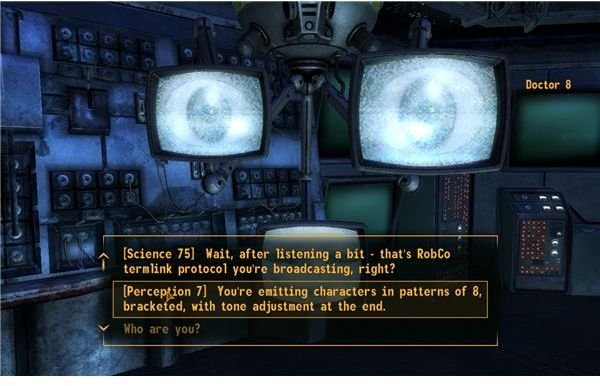So now we’ve covered the pitfalls of Fallout 3, Fallout 4, and Skyrim, and the places in which Bethesda has historically fallen just shy of building an experience with a true sense of agency on the part of the player. But there’s one game that I feel demonstrates a complete understanding of what creates an experience with agency, and pushes the limits of immersion and roleplaying within the technological limitations of its era. That game is Obsidian’s
Fallout: New Vegas
There were many things that made Fallout: New Vegas great, but I’ll try to summarize the things it did right by pointing out contrast to the criticisms I made in each of the last 3 parts.
Choice
Now, when I say choice, I mean REAL choice. Not Choice(tm) as described in Part 1. There is no single metric for “Karma” that puts you into either MegaHitler or Peewee Herman territory (well, there is, but it doesn’t actually matter to the flow of the game and appears to be something they merely forgot to take out of the engine). Instead, the people of the game are split into a number of factions, both major and minor, and how people treat you is based on your reputation with factions those people belong to. This has a number of implications, but the most important one is moral ambiguity. There is no strong morality associated with any one faction (Caesar’s Legion is pretty definitely evil, but that doesn’t mean the NCR is good), and you as a player can have any reason for personally helping or hindering any particular faction.
Further, the game actually prevents you from accessing some quests if certain factions are unfavorable to you. This is mostly consequential for the main quest, where the faction you side with defines which questline you follow for the last ~30% of the game, but you’re limited in the case of minor questlines as well. The fact that the main quest forces you to interact with a number of minor factions to either make alliances or cripple them, means that no matter how you choose to play, you will be forced to make choices and generate reputation with factions, either positive or negative. Not only can you make complex and reasoned choices about situations in the game, your choices actually matter.
Intent
One of my primary criticisms of Fallout 4 was the intent that was projected onto my character by the available dialogue options. I found it very difficult to roleplay, or to feel invested in the choices I was making, because instead of feeling like my character identified with my own intentions, it felt as though I was being told why I was doing the things I was doing. It’s a very jarring experience as a player, particularly when I’m given 4 stock options for how to respond to something, and I don’t agree with the content of any of them. There’s very little nuance or malleability to how the player character interacts with their surroundings.
In New Vegas, the dialogue was FANTASTIC. There was always a variety of ways to handle a situation, and the construction of the dialogue was never obviously oriented toward the same 4 response types. Instead, every NPC dialogue had a matching set of responses with an appropriate level of variance, never any more or less than was needed. If there were only 2 ways to answer a question, Obsidian did not look for a way to fill out 2 more options for the sake of uniformity. If 4 was too limiting, there were often 6 or 7 or 8 ways to respond. And the responses themselves often did not project a moral stance onto the player (though those existed if the player chose to play that way). And certainly, with respect to the faction system, there was always that same malleability that allowed you to make choices for your own reasons, without being told by the game why you were doing what you were doing.
Mechanic
And finally, the distinction I want to draw from Skyrim to New Vegas is in mechanics. Where the mechanics of play resulted in much the same play style regardless of what character you were in Skyrim, it was much the opposite in New Vegas. In New Vegas, the role you play in certain situations varies wildly based on your skills and attributes, mostly in the context of conversation, but also in ways to bypass certain obstacles or solve puzzles. Often there are multiple ways to get out of a sticky situation without a fight, many of them hilarious uses of particular skills and wit. In New Vegas, it matters who you are and what you can do, in more than just the application of those skills.
As a massive fan of New Vegas, this was also something that disappointed me about Fallout 4. In Fallout 4, the game is designed for you to battle your way from beginning to end, no exceptions. In New Vegas, it’s completely acceptable to get experience, level up, and complete the main quest without shedding a drop of blood. Of course, the wasteland is still a dangerous place, and you want to defend yourself. But New Vegas gives you the option to be whoever you want to be, even if you want to be a pacifist.
Now, I’m biased. I get that. New Vegas is my third favorite game of all time. It will always have a special place in my heart. But it’s got that place for a reason. It’s the game I keep coming back to, the one that I always start a fresh game with, play ~100 hours, and start all over again next time I come around to it. And those 100 hours are different every single time. No game was ever able to do that for me before, and I’m looking forward to when somebody is able to do it again.
